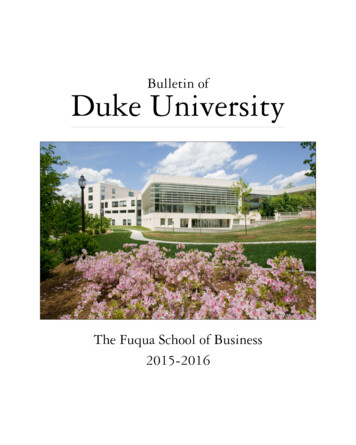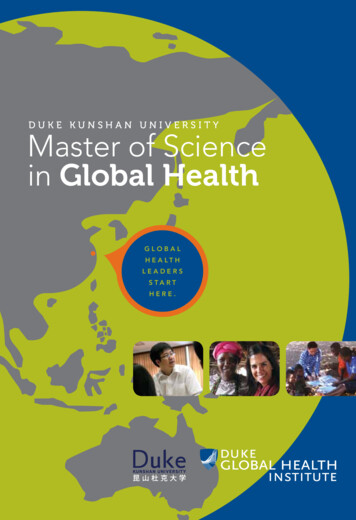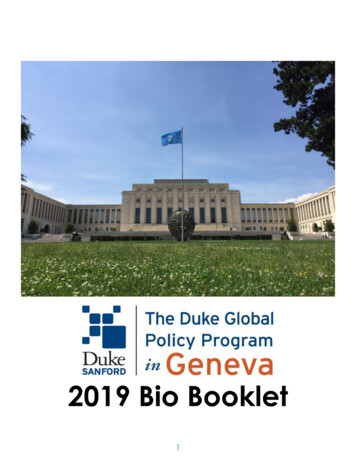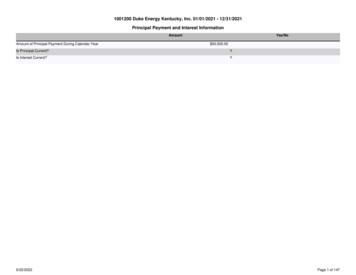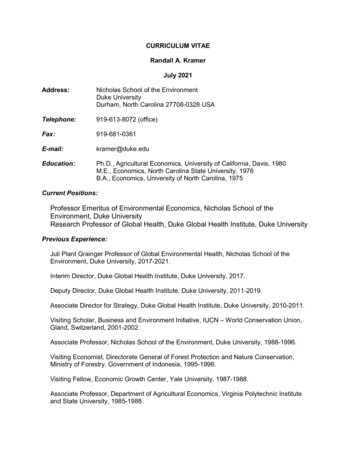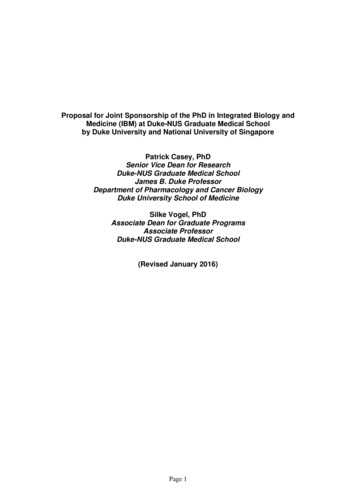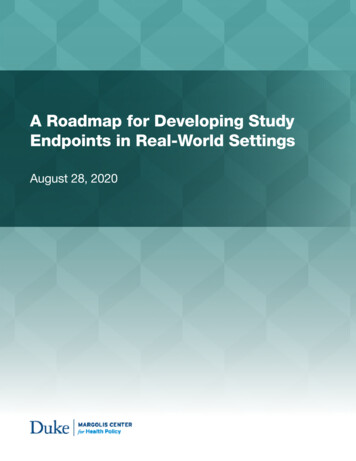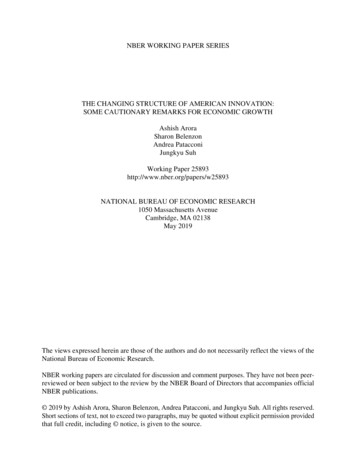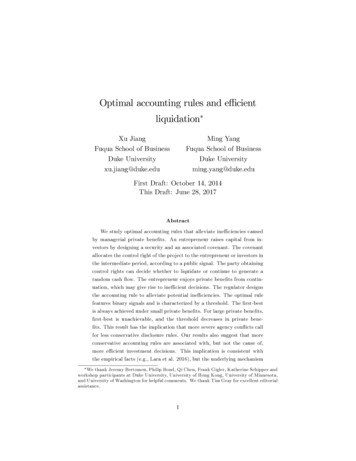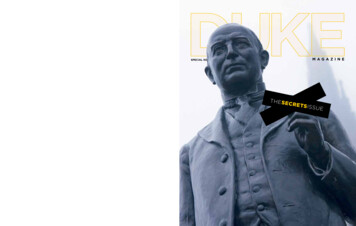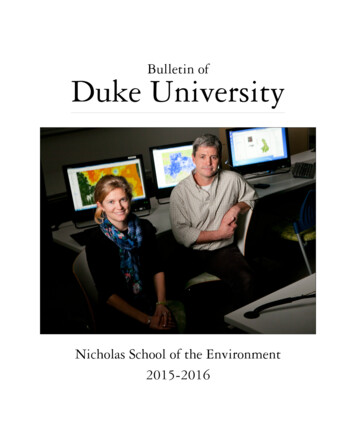
Transcription
Cover
Academic LiaisonsCynthia A. Peters and Scottee CantrellCoordinating EditorSarah KiblerPublications CoordinatorBahar RostamiPhotographsNicholas School of the EnvironmentThe information in this bulletin applies to the academic year 2015-2016 and is accurate and current, to thegreatest extent possible, as of September 2015. The university reserves the right to change programs of study, academic requirements, teaching staff, the calendar, and other matters described herein without prior notice, in accordance with established procedures.Duke University does not tolerate discrimination or harassment of any kind. Duke University has designatedDr. Benjamin Reese, vice-president for institutional equity, as the individual responsible for the coordination andadministration of its nondiscrimination and harassment policies generally. The Office for Institutional Equity islocated in Smith Warehouse, 114 S. Buchanan Blvd., Bay 8, Durham, NC 27708. Dr. Reese’s office telephonenumber is (919) 684-8222 and his e-mail address is ben.reese@duke.edu. Sexual harassment and sexual misconductare forms of sex discrimination and prohibited by the university. Duke University has designated Howard Kallem asits director of Title IX compliance and Age Discrimination Act coordinator. He is also with the Office forInstitutional Equity and can be contacted at (919) 684-1437 or howard.kallem@duke.edu.Questions or comments about discrimination, harassment, domestic violence, dating violence, and stalking canbe directed to the Office for Institutional Equity, (919) 684-8222. Additional information, including the completetext of the discrimination grievance procedure and the harassment policy and appropriate complaint procedures, maybe found by contacting the Office for Institutional Equity or visiting its website at http://www.duke.edu/web/equity.Questions or comments about sex-based and sexual harassment and misconduct, domestic violence, dating violence,and stalking committed by a student may also be directed to the Office of Student Conduct at (919) 684-6938.Additional information, including the complete text of the policy and complaint procedure for such misconduct,may be found at itle-ix.Duke University recognizes and utilizes electronic mail as a medium for official communications. The universityprovides all students with e-mail accounts as well as access to e-mail services from public clusters if students do nothave personal computers of their own. All students are expected to access their e-mail accounts on a regular basis tocheck for and respond as necessary to such communications.Information that the university is required to make available under the federal Clery Act is available by visitingthe Records Division, Duke University Police Department, 502 Oregon Street, Durham, NC 27708, or by calling(919) 684-4602. See http://duke.edu/police/news stats/clery/index.php for more details.The Family Educational Rights & Privacy Act (FERPA), 20 U.S.C § 1232g; 34 CFR Part 99, is a federal lawthat guides the release of students’ education records, of which disciplinary records are a part. For additional information about FERPA, see .htmlDuke University is accredited by the Commission on Colleges of the Southern Association of Colleges andSchools to award baccalaureate, masters, doctorate, and professional degrees. Contact the Commission on Colleges at1866 Southern Lane, Decatur, GA 30033-4097 or call (404) 679-4500 for questions about the accreditation of DukeUniversity.September 20152
ContentsThe Mission of Duke UniversityUniversity AdministrationAcademic Calendar 2015-16General Information56910IntroductionHistory of the Nicholas SchoolDivisionsLocationHistory of Duke UniversityFacilitiesDuke ForestDuke University Marine LaboratoryComputer ResourcesRegional ResourcesCampus ResourcesStudent Life101112131313141415151617Undergraduate Degree Programs22Environmental Sciences and Policy (ENVIRON)Earth and Ocean Sciences (EOS)Marine Science and Conservation Leadership (Undergraduate Certificate)Energy and the Environment (Undergraduate Certificate)Study at the Duke University Marine LaboratoryFinancial AidAcademic RecognitionThe Cooperative College 3-2 Program (Combined Undergraduate and Master’s Degrees)Professional Graduate Degree ProgramsThe Distinction between Professional and Doctoral DegreesProfessional Master’s DegreesProgram RequirementsProfessional ProgramsSpecial Tracks for Practicing ProfessionalsThe Cooperative College (3-2) ProgramConcurrent DegreesAcademic Information for Professional Degree StudentsAdmissionsFinancial InformationAcademic RegulationsCareer and Professional 460Nicholas Institute for Environmental Policy Solutions65Working with StudentsPublications and Events6666Doctoral Programs67Cooperative University ProgramsQualification of StudentsAdmissionGraduate School RegistrationFellowships and Assistantships for Doctoral StudentsContents 36869696970
Research Centers72Center for Tropical ConservationDuke River CenterDuke University Wetland CenterSuperfund Research CenterDuke Center for Sustainability & Commerce7273737374The Faculty75Core FacultyExtended FacultyFaculty Emeriti758993Courses of Instruction94Courses Taught in DurhamCourses Taught at the Marine Laboratory94129Index145Contents 4
The Mission of Duke UniversityJames B. Duke’s founding Indenture of Duke University directed the members of the university to “provide realleadership in the educational world” by choosing individuals of “outstanding character, ability and vision” to serve asits officers, trustees and faculty; by carefully selecting students of “character, determination and application;” and bypursuing those areas of teaching and scholarship that would “most help to develop our resources, increase ourwisdom, and promote human happiness.”To these ends, the mission of Duke University is to provide a superior liberal education to undergraduatestudents, attending not only to their intellectual growth but also to their development as adults committed to highethical standards and full participation as leaders in their communities; to prepare future members of the learnedprofessions for lives of skilled and ethical service by providing excellent graduate and professional education; toadvance the frontiers of knowledge and contribute boldly to the international community of scholarship; to promotean intellectual environment built on a commitment to free and open inquiry; to help those who suffer, cure diseaseand promote health, through sophisticated medical research and thoughtful patient care; to provide wide rangingeducational opportunities, on and beyond our campuses, for traditional students, active professionals and life-longlearners using the power of information technologies; and to promote a deep appreciation for the range of humandifference and potential, a sense of the obligations and rewards of citizenship, and a commitment to learning,freedom and truth.By pursuing these objectives with vision and integrity, Duke University seeks to engage the mind, elevate thespirit, and stimulate the best effort of all who are associated with the university; to contribute in diverse ways to thelocal community, the state, the nation and the world; and to attain and maintain a place of real leadership in all thatwe do.Adopted by the Board of Trustees on February 23, 2001The Mission of Duke University 5
University AdministrationGeneral AdministrationRichard H. Brodhead, PhD, PresidentSally Kornbluth, PhD, ProvostTallman Trask III, MBA, PhD, Executive Vice PresidentA. Eugene Washington, MD, Chancellor for Health Affairs and the President and Chief Executive Officer of theDuke University Health SystemPamela J. Bernard, JD, Vice President and General CounselKyle Cavanaugh, MBA, Vice President for AdministrationTracy Futhey, MS, Vice President, Information Technology and Chief Information OfficerMichael Merson, MD, Interim Vice President and Vice Provost, Global Strategy and ProgramsLarry Moneta, EdD, Vice President, Student AffairsJohn J. Noonan, MBA, Vice President, FacilitiesBenjamin Reese, PsyD, Vice President, Office for Institutional EquityRichard Riddell, PhD, Vice President and University SecretaryMichael J. Schoenfeld, MS, Vice President, Public Affairs and Government RelationsRobert Shepard, PhD, Vice President, Alumni Affairs and DevelopmentTimothy Walsh, MBA, Vice President for FinanceKevin M. White, PhD, Vice President and Director of AthleticsPhail Wynn, Jr., MBA, EdD, Vice President, Durham and Regional AffairsNancy C. Andrews, MD, PhD, Dean, School of Medicine and Vice Chancellor for Academic AffairsWilliam Boulding, PhD, Dean, Fuqua School of BusinessMarion E. Broome, PhD, RN, FAAN, Dean, School of Nursing and Vice Chancellor for Nursing AffairsKelly Brownell, PhD, Dean, Sanford School of Public PolicyEllen F. Davis, PhD, Interim Dean, Divinity SchoolThomas C. Katsouleas, PhD, Dean, Pratt School of EngineeringDavid F. Levi, JD, Dean, School of LawPaula B. McClain, PhD, Dean, Graduate SchoolStephen Nowicki, PhD, Dean and Vice Provost, Undergraduate EducationValerie Ashby, PhD, Dean, Trinity College of Arts and SciencesLuke A. Powery, ThD, Dean of Duke ChapelAlan Townsend, PhD, Dean, Nicholas School of the EnvironmentNancy B. Allen, MD, Vice Provost, Faculty Diversity and Faculty DevelopmentLawrence Carin, PhD, Vice Provost for ResearchDeborah Jakubs, PhD, Vice Provost for Library AffairsScott Lindroth, PhD, Vice Provost for the ArtsJames S. Roberts, PhD, Executive Vice Provost for Finance and AdministrationSusan Roth, PhD, Vice Provost for Interdisciplinary StudiesKeith Whitfield, PhD, Vice Provost for Academic AffairsNeal F. Triplett, MBA, President & CEO, DUMACGeneral Academic AdministrationSally Kornbluth, PhD, ProvostStephen Nowicki, PhD, Dean and Vice Provost, Undergraduate EducationNancy B. Allen, MD, Vice Provost, Faculty Diversity and Faculty DevelopmentKatharine Bader, MA, Assistant Vice Provost and Director, Student Information Services and SystemsFrank J. Blalark, PhD, Assistant Vice Provost and University RegistrarKimberley Harris, BS, Director, Academic Human ResourcesDeborah Jakubs, PhD, University Librarian and Vice Provost for Library AffairsDavid Jamieson-Drake, PhD, Director, Institutional ResearchUniversity Administration 6
Deborah A. Johnson, PhD, Assistant Vice Provost, Undergraduate Education and Director, Administrative andCommunity Support ServicesScott Lindroth, PhD, Vice Provost for the ArtsJacqueline Looney, EdD, Associate Vice Provost for Academic Diversity and Associate Dean of the Graduate SchoolAmy Oates, BA, Director, Academic Financial Services and SystemsJames S. Roberts, PhD, Executive Vice Provost for Finance and AdministrationSusan Roth, PhD, Vice Provost for Interdisciplinary StudiesLawrence Cairn, PhD, Vice Provost for ResearchKeith W. Whitfield, PhD, Vice Provost for Academic AffairsJulian Lombardi, PhD, Vice Provost for Academic Services and TechnologyEric Toone, PhD, Vice Provost for Innovation & Entrepreneurship InitiativeMichael Merson, MD, Vice Provost for Global Strategy and ProgramsAdministration of the Nicholas School of the EnvironmentAlan R. Townsend, PhD, DeanDean L. Urban, Professor and Senior Associate Dean, Academic InitiativesCharlotte Nuñez-Wolff, EdD, COO/Senior Associate Dean, Administration and FinanceBrian McGlynn, PhD, Chair, Division of Earth and Ocean SciencesJeffrey R. Vincent, PhD, Chair, Division of Environmental Sciences and PolicyCindy Van Dover, PhD, Chair, Marine Science and Conservation and Director, Duke University Marine LaboratoryErika S. Weinthal, PhD, Associate Professor and Associate Dean, International ProgramsJesko von Windheim, PhD, Professor of the Practice and Associate Dean, Innovation and EntrepreneurshipKevin P. McCarthy, MS, Associate Dean, External AffairsScottee Cantrell, MA, Associate Dean, Marketing and CommunicationsJohn Robinson, MS, Assistant Dean, Information TechnologyKaren Kirchof, MS, Assistant Dean, Professional and Career DevelopmentSherri C. Nevius, MEM, Assistant Dean, Executive and Distance Learning ProgramsCynthia A. Peters, BA, Assistant Dean, Academic and Enrollment ServicesLisa Campbell, PhD, Associate Professor and Director of Graduate Studies (MSC)Charlotte Clark, PhD, Lecturer and Director of Undergraduate ProgramsAlex Glass, PhD, Lecturer and Director of Undergraduate Studies (EOS)Nicolas Cassar, PhD, Associate Professor and Director of Graduate Studies (EOS)Joel Meyer, PhD, Associate Professor and Director of Graduate Studies (ESP)Tom Schultz, PhD, Lecturer and Director of Undergraduate Studies, Duke University Marine LaboratoryJennifer Swenson, PhD, Assistant Professor of the Practice and Director of Professional ProgramsRebecca Vidra, PhD, Lecturer and Director of Undergraduate Studies (ENV)Sara Childs, Duke Forest Resource ManagerRachel Lo Piccolo, PhD Program Coordinator, Duke University Marine LaboratoryErika Lovelace, Senior Program Coordinator, Academic and Enrollment ServicesBeatriz Martin, PhD Program Coordinator, Earth and Ocean Sciences DivisionHelen Nearing, Academic Coordinator, Duke University Marine LaboratoryDanielle Wiggins, Administrative Coordinator, Environmental Science and Policy DivisionSarah A. Phillips, Academic and Enrollment Services Coordinator, Duke University Marine LabKatie E. Wood, Undergraduate Program Coordinator, Duke University Marine LabBoard of Visitors, Nicholas School of the EnvironmentVirginia Parker, T’80, Parker Global Strategies LLC, Stamford, CT (Chair)J. Curtis Moffatt, T’73, Kinder Morgan, Inc., Houton, TX (Vice Chair)Benjamin S. Abram, E’07, Wylan Capital, Menlo Park, CAMarcia A. Angle, MD’81, Durham, NCFielding Arnold, T’01, Durham, NCDavid B. Brewster, F’00 (MEM), EnerNoc, Inc, Boston, MAR. Jeffrey Chandler, T’84, Rose Grove Capital, New York, NYUniversity Administration 7
Steven Elkes, Makeover Solutions, Briarcliff Manor, NYMichael & Annie Falk, Comvest Partners, Palm Beach, FLPatricia Hatler, T’76, Nationwide Insurance, Columbus, OHJ Murray Hill, T’79, B’80, Boulder, COPeter Layton, Blackthorne Capital Management, Whitewater, WIAnne Mize, WC’68, Mize Family Foundation, Seattle, WAJ.K. Nicholas, T’89, B’96, Chelsea Clocks, Chelsea, MAMichael R. Parker, Parker Global Strategies LLC, Stamford, CTRebecca Patton, T’77, Palo Alto, CAEdward M. Prince, Jr. G’93, Neustar, Inc, Sterling, VADonald Santa, T’80, Interstate Natural Gas Association of America, Washington, DCBradley Schwartz, E’79, Blue Canopy LLC, Reston, VATruman T. Semans Jr., T’90, B’01, Pew Center on Global Climate Change, Arlington, VABarbara T’79, P’11 and Neil Smit T’80, P’11, Comcast Cable Communications, Philadelphia, PABradford, T’81 and Shelli Stanback, Canton, NCAlison Leigh Taylor, T’84, Siemens Corporation, Washington, DCPhilip Turbin, T’92, ML, Pierce, Fenner & Smith, New York City, NYFrederick Vosburgh, T’72, PhD’78, Physical Devices LLC, Raleigh, NCTim Profeta, L’97, F’97 (MEM), Nicholas Institute for Environmental Policy Solutions, Durham, NC (Ex-Officio)William K. Reilly, Aqua International Partners, L.P., San Francisco, CA (Ex-Officio)Alumni Council, Nicholas School of the EnvironmentCourtney Lorenz, MEM’06, Skanska USA, Durham, NC (President)Shannon Lyons Green, CEM’04, Lenfest Ocean Program, Pew Charitable Funds, Washington, DC (President-elect)Patrick Bean, MEM’08, King Abdullah Petroleum Studies and Research Center, Saudi ArabiaKristen Bremer, MEM’13, US Environmental Protection Agency, RTP, NCKirsten Cappel, MEM'04, US Environmental Protection Agency, Washington, DCNick DiLuzio, FRM’10, Newfields, Atlanta, GAAleksandra Dobkowski-Joy, MEM’98, Framework LLC, Stamford, CTJohn Gust, F’04, Fannie Mae, Washington, DCJim Hildenbrand, MEM ‘12, Durham, NCDaniel Kolomeets-Darovsky, MEM’10, The Selestos Group, Inc., Durham, NCYe Lin, EE/MEM’12, Aramark, Berkeley, CAEric McDuffie, MEM’13, Orange County Schools, Hillsborough, NCDana Mooney, MEM’04, Hitachi Consulting, Gaithersburg, MDMargaret Peloso, MEM’06, Vinson & Elkins LLC, Washington, DCSyril Pettit, F’97, HESI, Washington, DCPaul Quinlan, MEM/MPP’06, ScottMadden, Raleigh, NCStewart Tate, MEM’96, The Shaw Tate Group, Charlotte, NCEsi Waters, MEM’13, Norfolk Southern Corp, Norfolk, VAKevin Wheeler, MEM’99, Consortium for Ocean Leadership, Washington, DCUniversity Administration 8
Academic Calendar 2015-16The Nicholas SchoolFall 2015Summer 2015February 16May 13May 14May 15May 25June 22June 23June 24June 25June 29July 1July 3August 6August 7August 7August 9Monday—Registrationbegins for all summersessionsWednesday—Term Iclasses begin. TheMonday class meetingschedule is in effect onthis day. (Therefore, allsummer classes meet thisday.) Regular classmeeting schedule beginson Thursday, May 14;Drop/add continuesThursday—Regularclass meeting schedulebeginsFriday—Drop/add forTerm I endsMonday—Memorial Dayholiday. No classes areheldMonday. Term I classesendTuesday—Reading periodWednesday—Term Ifinal examinations beginThursday—Term Ifinal examinations endMonday—Term II classesbeginWednesday—Drop/add for Term II endsFriday—IndependenceDay holiday. No classesare heldThursday—Term IIclasses endFriday—Readingperiod (until 7 p.m.)Friday—Term II finalexaminations begin,7 p.m.Sunday—Term II finalexaminations endAugust 17August 19August 24September 4September 7October 2October 4October 9October 14November 4November 18November 19November 24November 24November 30-December 7December 8December 13Monday—New graduate student orientation beginsWednesday—4 p.m. Convocation for graduate andprofessional school studentsMonday—8:30 a.m. Fall semester classes begin;Drop/add continuesFriday—Drop/add endsMonday—Labor Day. Classes in sessionFriday—5:30 p.m. Founders’ Day ConvocationSunday—Founders’ DayFriday—7 p.m. Fall break beginsWednesday—8:30 a.m. Classes resumeWednesday—Registration begins for Spring 2016Wednesday—Registration ends for SpringSemester, 2016Thursday—Drop/add begins for Spring 2016Tuesday—10:30 p.m. Thanksgiving recess beginsTuesday—Graduate classes endMonday-Monday—Graduate reading periodTuesday—Final examinations begin (9 a.m.)Sunday—10 p.m. Final examinations endSpring 2016January 13January 14January 18January 27February 22March 11March 21April 6April 15April 16April 20April 21-May 1May 2May 7May13May 4Wednesday—8:30 a.m. Spring semester begins.The Monday class meeting schedule is in effect on thisday; Regular class meeting schedule begins onThursday, January 14; Classes meeting in aWednesday/Friday meeting pattern begin January15;Drop/add continuesThursday—Regular class meeting schedule beginsMonday—Martin Luther King, Jr. Day holiday.classes are rescheduled on Wednesday, January 8Wednesday—Drop/add endsMonday—Registration begins for Summer 2016Friday—7 p.m. Spring recess beginsMonday—8:30 a.m. Classes resumeWednesday—Registration begins for Fall 2016;Summer 2016 registration continuesFriday—Registration ends for Fall 2016;Summer 2016 Registration continuesSaturday—Drop/add begins for Fall 2016Wednesday—Graduate classes endThursday-Sunday—Graduate reading periodMonday—Final examinations beginSaturday—10 p.m. Final examinations endFriday—Commencement beginsSunday—Graduation exercises; conferring of degreesThe dates on this calendar are subject to change. Past, current, and future academic calendars can be found online at ic Calendar 2015-16 9
General InformationIntroductionHeadquartered in the heart of the Duke University campus, the Nicholas School of the Environment—notEnvironmental Sciences, or Environmental Studies, but the Environment—strives for a new paradigm, one that viewsand attempts to understand the earth and the environment including humans as an integrated whole. And one thatadvances a more sustainable future by strategically focusing its resources on addressing the major environmentalissues of our times and by training a new and environmentally-informed generation of global leaders.To achieve this vision, the Nicholas School has assembled a unique and talented faculty of world-class researchersand educators spanning all of the relevant physical, life, and social sciences, steeped and actively engaged in theirrespective disciplines, but also committed to the multi- and interdisciplinary lines of inquiry and collaborations thatare at the core of many environmental issues.The Nicholas School’s mission, to create knowledge and global leaders of consequence for a sustainable future, isinformed by Duke University’s theme of knowledge in the service of society and motivated by the need to restore andpreserve the world’s environmental resources while adapting to a changing climate and a growing population withaspirations for rising standards of living. We strive to fulfill this mission by: Creating Knowledge through basic, applied, and multidisciplinary research in the relevant physical, life, andsocial sciences designed to expand our understanding of the Earth and its environment;General Information 10
Creating Global Leaders through: an undergraduate academic program designed to spread understanding of the Earth and the environmental ethic to a new cadre of Duke graduates; a professional masters program that trains a new breed of environmental professionals working in thepublic, private, and non-profit sectors with the skills needed to devise and implement effective environmental policies and practices; and a Ph.D. program dedicated to adding to a new generation of world-class scientists, researchers, and educators in the environment; Forging a Sustainable Future by strategically focusing the intellectual resources and capital amassed inresearch and education to address three of the most challenging environmental issues confronting society: climate and energy terrestrial and marine ecosystems human health and the environmentGraduate Professional DegreesMost students entering the Nicholas School seek graduate professional degrees, preparing for careers as expertenvironmental problem-solvers after two years of study. The master of environmental management (MEM) degreetrains students to understand the scientific basis of environmental problems, as well as the social, political, andeconomic factors that determine effective policy options for their solution with an eye toward forging a sustainablefuture. Mid-career environmental professionals can also earn the MEM degree through the Duke EnvironmentalLeadership (DEL) program (through a combination of traditional and distance learning formats, students focus onenvironmental management and leadership development). The master of forestry (MF) degree develops experts insustainable management of forested ecosystems. Students enrolling at the Nicholas School also have the opportunityto seek concurrent degrees with The Fuqua School of Business (MBA), Duke Law School (JD), the Sanford School ofPublic Policy (MPP), the Pratt School of Engineering (MEMP), and the master of arts in teaching (MAT) throughThe Graduate School.Doctoral DegreesThe traditional PhD, which is offered to Nicholas School students through The Graduate School, provides theopportunity for students to pursue in-depth interest in a more narrowly focused field in preparation for a career inteaching and/or research or in application-oriented settings. Doctoral students work with faculty in each of theNicholas School’s three divisions: environmental sciences and policy, earth and ocean sciences, and marine science andconservation.Undergraduate DegreesThe Nicholas School cooperates with the Trinity College of Arts & Sciences in awarding four undergraduatedegrees: the AB in environmental science and policy, the BS in environmental sciences, and the BA and BS in earthand ocean sciences. In addition, minors are offered in both environmental sciences and policy and earth and oceansciences. Certificate programs are offered in energy and the environment and marine science and conservationleadership. Courses for the majors are taught by more than sixty Duke professors in twenty cooperating departmentsand schools. The Department of Biology offers a BS with a concentration in marine biology that is fulfilled by asemester in residence at the Duke University Marine Laboratory—a major facility of the Nicholas School.History of the Nicholas SchoolThe Nicholas School of the Environment at Duke University, represents the joining of three programs whosehistories are almost as old as the university itself: the School of Forestry and Environmental Studies and the DukeUniversity Marine Laboratory, both formed in 1938, and the Department of Geology, founded in 1936.In 1932, forestry instruction was first offered to undergraduate students, and in 1938 the School of Forestry wasestablished as a graduate professional school under the direction of Dean Clarence F. Korstian. Dr. Korstian hadjoined the faculty in 1931 as the first director of the Duke Forest. Brought to Durham by Dr. William P. Few,president of Duke at the time, Dr. Korstian set out to develop a demonstration and research forest that would serve asa model for owners of small tracts of timber in the South.General Information 11
The master of forestry and doctor of forestry degrees were offered initially, and later the AM, MS, and PhD wereoffered through The Graduate School. The school’s forestry program has been fully accredited by the Society ofAmerican Foresters since 1939.Growing national concern with natural resources and environmental problems led to a new teaching andresearch emphasis in ecology in the 1970s. In 1974, the school’s name was changed to the School of Forestry andEnvironmental Studies, and a new degree was added: the master of environmental management (MEM).The Duke University Marine Laboratory also had its beginnings in the 1930s, when Dr. A.S. Pearse andcolleagues from Duke were attracted to Pivers Island and its surrounding abundance of marine life for their summerfield studies. The island afforded an excellent location for a field station. Through the subsequent efforts of Dr. Pearseand others, the land was acquired, and the first buildings of the Duke University Marine Laboratory were built in1938. Originally, the Marine Lab served only as a summer training and research facility. Today, it operates year-roundto provide training and research opportunities to nearly 10,000 people annually.In 1991, the School of Forestry and Environmental Studies was combined with the Duke University MarineLaboratory to form the School of the Environment. The new school represented an unprecedented universitycommitment to interdisciplinary education and research in environmental science, policy, and management. It wasthe only private graduate professional school of its type in the country. The school became the Nicholas School of theEnvironment in 1995 after a generous gift from Duke graduates Peter and Ginny Nicholas.In 1997, the Division of Earth and Ocean Sciences was created when the former Department of Geology,previously a part of Trinity College of Arts & Sciences, joined the school. This department also dates from the 1930swhen Dr. Willard (Doc) Berry was hired as the first geologist at Duke University. By the 1960s, the Department ofGeology had established itself as a center for the study of sedimentary geology. Today, as the Division of Earth andOcean Sciences, it focuses on a number of areas at the intersection of earth and environmental sciences.In the spring of 2014, the school celebrated the opening of Duke Environment Hall, a 70,000-square-footfacility designed to meet or exceed the criteria for LEED Green Building platinum certification, the highest level ofsustainability.DivisionsThe school is composed of three divisions, which serve graduate professional, doctoral, and undergraduatestudents:Earth and Ocean SciencesWith focal areas in climate change, energy, solid earth processes and surficial processes, this division isheadquartered in the Levine Science Research Center on Duke’s West Campus. The EOS faculty conduct research allover the world, from the 3,200-meter-deep Hess Deep trench in the Pacific Ocean to the 4,000-meter altitudes of theSouth American Altiplano.Environmental Sciences and PolicyWith focal areas in ecosystem science and management, environmental health, wetlands, and environmentaleconomics and policy, ESP is headquartered in the Duke Environment Hall. Faculty with training in the biological,physical, chemical, and social sciences work on applied and basic environmental research problems. The divisionstresses interdisciplinary approaches to environmental problem solving.Marine Science and ConservationThe mission of the Division of Marine Science and Conservation is education, research, and service to understandmarine systems, including the human component, and to develop approaches for marine conservation andrestoration. The MSC division is headquartered at the Duke University Marine Laboratory in Beaufort, NorthCarolina. Faculty research interests include biological and physical oceanography, marine biology and conservation,marine environmental health, marine biotechnology, and marine policy and management.General Information 12
LocationDuke University is situated in Durham, a city of more than 273,000 inhabitants in the central piedmont regionof North Carolina. The Appalachian escarpment lies approximately one hundred miles to the west of Durham, andthe coastal plain is but a short distance to the east. The Duke University Marine Laboratory is located 180 miles tothe southeast of Durham, on Pivers Island, adjacent to the historic town of Beaufort, North Carolina. The NicholasSchool is thus ideally situated near areas of ecological and topographic diversity that offer many opportunities forstudy
Dr. Benjamin Reese, vice-president for institutional equity, as the individual responsible for the coordination and administration of its nondiscrimination and harassment policies generally. The Office for Institutional Equity is located in Smith Warehouse, 114 S. Buchanan Blvd., Bay 8, Durham, NC 27708. Dr. Reese's office telephone
